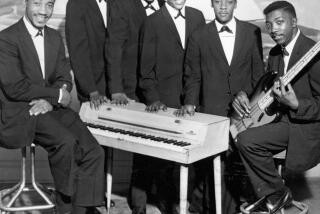Drummer Tony Williams Brought a New Spark to Jazz
- Share via
When Tony Williams joined the Miles Davis band in 1963, he could easily have been mistaken for a zealous young fan who had talked his way onto the bandstand. He was, after all, only 17 1/2 years old, and he looked it. But Davis knew that Williams was something special.
“Trumpet players love to play with great drummers, and I could definitely hear right away that this was going to be one of the baddest . . . who ever played a set of drums,” said Davis in his “Autobiography” (Simon & Schuster, written with Quincy Troupe). Working with pianist Herbie Hancock, bassist Ron Carter and saxophonist Wayne Shorter, Williams combined with Davis to produce some of the finest jazz improvisations ever created.
“Tony was the fire, the creative spark,” Davis continued. “I was learning something new every night with that group. I can tell you this: There ain’t but one Tony Williams when it comes to playing the drums. There was nobody like him before or since.”
With his characteristically astute ability to judge talent, Davis was right on target. And Williams, who died Sunday at 51 after a heart attack, was quick to underscore his debt to the trumpeter.
“I don’t think you could get better than Miles,” he said recently. “He was great. I had some run-ins with him because I was so young that there were times when I didn’t know what was going on. But Miles was great. . . . He was somebody that I really admired. And that’s one thing I’ll always remember from the whole experience: Miles was proud of me.”
Williams, with Elvin Jones, dominated jazz drumming in the ‘60s and beyond. And his method of playing counter-rhythms and polyrhythms that generated complex layers of rhythm--while still maintaining an airy, propulsive sense of swing--has had a profound effect on the jazz drumming of the last three decades.
His work on such Davis albums as “Seven Steps to Heaven,” “My Funny Valentine,” “Miles Smiles” and “Miles in the Sky” and in the extraordinary live performance “Live at the Plugged Nickel” is, in retrospect, astounding. With virtually no precursors--except possibly Jones’ work with John Coltrane--the youthful Williams almost single-handedly took jazz drumming and jazz timekeeping to another level.
Yet the powerful accomplishment that his work with Davis represented was only one part of a significant, dual burst of creativity that Williams experienced in the ‘60s. Late in the decade, he organized the group Lifetime, a trio with guitarist John McLaughlin and organist Larry Young (Khalid Yanin) that carried the concept of jazz-rock fusion into unexplored territory (see accompanying review).
Although Williams continued to be a strong creative force in jazz into the present, he never again quite rose to the heights of his work with Davis and Lifetime. Leading various groups of his own, getting together with Hancock in the band V.S.O.P. and reuniting with Hancock, Shorter and Carter (as well as trumpeter Wallace Roney), he always performed with his typical excellence.
But the relentless creative surge, the almost overpowering sense of energy and fire, that was present in the ‘60s and early ‘70s seemed abated. Williams wanted that creativity and energy to find a new expression via his compositions, and to some extent it did. His latest album, “Wilderness,” included works for orchestra and small group suggesting potentially provocative new directions.
Always a fascinating thinker and conversationalist, Williams could also be direct, to the point, even difficult. But his more obstinate moments were usually informed by an emotional warmth and a desire to communicate. He was, after all, a person who had the hazards of the jazz life thrust upon him when he was not yet an adult.
That he managed to survive, even prevail, as an artist and an individual is testimony to a character that was as rich and complex as his music.
* The funeral for Tony Williams will be held at St. Ignatius Cathedral in San Francisco today at 11:30 a.m. Information: (415) 422-4200. Contributions and donations can be made to the Tony Williams Memorial Fund, P.O. Box 1429, Pacifica, CA 94044.
More to Read
The biggest entertainment stories
Get our big stories about Hollywood, film, television, music, arts, culture and more right in your inbox as soon as they publish.
You may occasionally receive promotional content from the Los Angeles Times.










